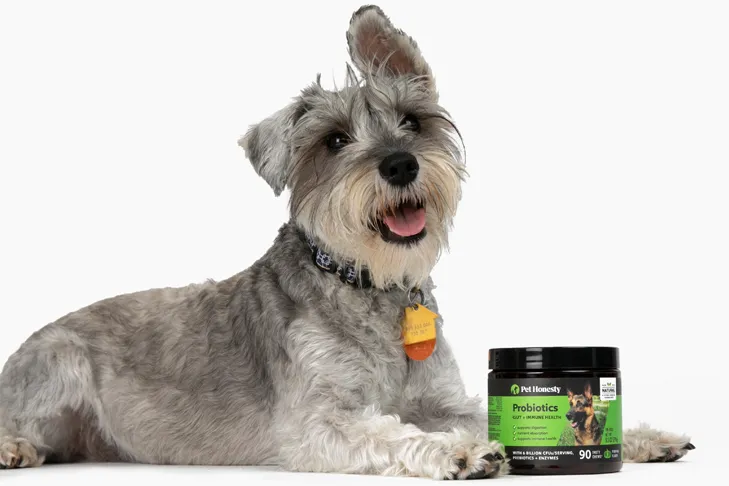Yeast infections can make your dog’s life miserable, causing itchy, inflamed skin, greasy coats, and foul odors like sour milk. These infections are especially common in dogs with allergies, poor diets, or after antibiotic use. If you’re dealing with a yeast overgrowth, probiotics for dogs to help with yeast infection offer a natural way to restore balance. By supporting the “good” bacteria in your dog’s gut, skin, and ears, probiotics can reduce yeast proliferation and improve overall health. In this guide, we’ll explore how these supplements work, their benefits, and tips for choosing the right one.
Veterinarians often recommend probiotics alongside diet changes and treatments for yeast issues. According to experts like Dr. Amy Attas, VMD from City Pets in New York, probiotics are living microorganisms—such as beneficial bacteria and yeast—that mimic the natural flora in a dog’s body. They help maintain a healthy microbiome, which is crucial since disruptions from diet, toxins, or medications can lead to yeast overgrowth.
Why Probiotics Are Essential for Dogs
Every dog hosts a microbiome of bacteria, fungi, and viruses that influences health. The gut microbiome, in particular, relies on “good bacteria” for digestion and nutrient absorption. Poor diets high in sugars or carbs feed yeast, while antibiotics wipe out beneficial bacteria, creating an opportunity for yeast to thrive.
Probiotics are non-pathogenic microbes that survive stomach acid to colonize the gut. “When ingested in appropriate amounts, probiotics can confer health benefits for dogs,” Dr. Attas explains. They produce vitamins, fight harmful pathogens, and create an acidic environment inhospitable to yeast. This is vital for dogs prone to recurring infections.
Common Causes of Yeast Infections in Dogs
Yeast, a fungus, naturally lives in small amounts on a dog’s skin, ears, and mucous membranes. Problems arise when it overgrows due to factors like allergies, bacterial infections, humid environments, or high-carb diets. Ears are a hotspot—watch for head tilting, rubbing, scabs, waxy discharge, or balance issues. Skin may show hair loss, greasiness, or that distinctive yeasty smell.
Long-term antibiotics exacerbate this by killing good bacteria, allowing yeast to dominate. Dogs with floppy ears, like Cocker Spaniels or Labs, or those in hot climates, are at higher risk. Early signs include excessive scratching, red paws, or chronic ear problems, so consult a vet for diagnosis via skin scrapes or cytology.
Key Benefits of Probiotics for Yeast-Prone Dogs
Probiotics go beyond gut health; they’re available over-the-counter at pet stores or online and can complement vet-prescribed therapies. Key advantages include:
- Nutrient Absorption: Helps dogs get more from their food, supporting skin health.
- Allergy Relief: Reduces inflammation linked to yeast.
- Digestive Support: Eases diarrhea, gas, and IBD symptoms.
- Yeast Inhibition: Crowds out fungus and harmful bacteria.
- Immune Boost: Fights infections naturally.
- Overall Wellness: Improves coat shine and energy.
Safe for weaned puppies, they’re especially helpful post-antibiotics. For skin issues, consider pairing with best wet dog food for skin and coat, which provides omega fatty acids to soothe irritation.
Studies back this: Strains like Lactobacillus acidophilus produce lactic acid, lowering gut pH and making it harder for yeast (like Malassezia) to grow. Bifidobacteria similarly compete for space and nutrients.
How Probiotics Specifically Combat Yeast Infections
Probiotics restore microbial balance in the gut, ears, skin, and mucous membranes, creating a yeast-resistant environment. “Normal bacteria compete with yeast, preventing colonization,” Dr. Attas notes. After antibiotics, they repopulate quickly, averting secondary infections.
Specific strains shine here: Lactobacillus acidophilus acidifies the gut, while Saccharomyces boulardii treats diarrhea and yeast-related GI upset. Even certain E. coli strains can act as probiotics in controlled doses. Topical probiotics may help skin and ears directly.
For dogs with ear woes, supplements to prevent ear infections in dogs like these can reduce recurrence. Owners report fewer vet visits, shinier coats, and happier pets.
 Pet Honesty product image
Pet Honesty product image
Smart Tips for Choosing and Using Dog Probiotics
Pick Dog-Specific Formulas
Human probiotics differ due to co-evolved bacteria—stick to canine products in powders, chews, capsules, or liquids. Flavors like peanut butter make dosing easy; avoid xylitol or toxic additives.
Choose Reputable Brands with Multiple Strains
Unregulated by the FDA, look for NASC seals, third-party testing, and live CFU counts (billions per dose). Multi-strain options cover more bases than single-strain foods.
 Berger Picards laying down together in a field.
Berger Picards laying down together in a field.
Pair with healthy dog food for yorkies or similar balanced kibble—probiotic kibble often lacks potency. Refrigerate as needed and check expirations for live cultures.
Dosage and Introduction
Follow labels for weight-based dosing; start slow to avoid tummy upset. Monitor for allergies, though rare. Vets suggest 4-8 weeks for yeast benefits.
Probiotics for issues like best probiotic for dog tear stains often overlap with yeast control, as imbalances affect eyes too.
Final Thoughts on Probiotics for Yeast Relief
Probiotics for dogs to help with yeast infections empower you to tackle root causes naturally, restoring balance and preventing flare-ups. Combine with vet advice, allergy testing, low-carb diets, and ear cleaning for best results. Dr. Attas highlights anecdotal wins: better digestion, fewer infections, healthier skin.
Always consult your veterinarian before starting supplements, especially with ongoing meds. Your dog’s comfort is worth it—track progress and adjust as needed. Explore more tips on our site for thriving pets!
